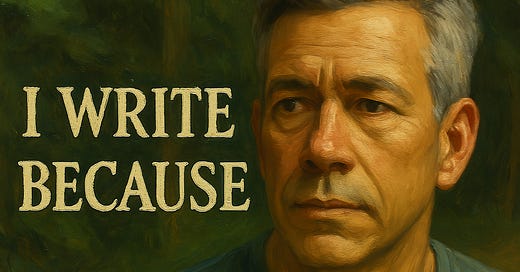I write because it’s the only place where I can stop pretending—without the risk of losing everything I’ve built by pretending.
There was a time when I could lie my way into anyone’s heart. I learned early that I could manufacture a connection if I hid my true desires, motives, and feelings. It was transactional. It was strategic. And it worked. I got what I wanted—attention, affection, and approval (the Triple As). And damn, was I good at it.
But I never got seen. I was so drunk on the triple As that the part of me that wanted to be seen was the sober, wet blanket sulking in the corner of the frat party, watching the manufactured me do keg stands to a round of applause.
By my mid-twenties, I realized I had a lot of friends—but none of them actually knew me. They knew a version of me that I introduced them to. A curated persona I had built to keep the real me safe. They had me as a friend, but I didn’t have them. It was a paradoxical form of loneliness. Friends and lovers surrounded me, but our relationships were all built on the big lie - I was presenting who I thought they wanted, not who I was. Again, damn, was I good at this.
I tried to break free because the discomfort of incongruous realities began to take form. I remember testing honesty as a young adult. But without practice, my “honesty” manifested as angry, sharp-edged, and clumsy. I thought I was finally letting the “real me” out—but I was swinging wildly in the dark, trying to hit something that felt true while secretly relieved that the darkness would ensure I was unsuccessful.
By my mid-thirties, the version of me I’d kept locked away had grown numb to the triple A’s. I had built an identity around chasing them—earning them, manipulating for them, performing whatever version of myself would get the biggest dose. But over time, like any addict, I developed a tolerance. The hits stopped landing. The buzz wore off.
But the real me? He hadn’t disappeared. He was still in there—pacing, restless, rattling the bars. And writing became the first sign of a key. Not freedom, not yet. But possibility. Each word was a quiet act of rebellion. I slipped a message through the bars as a test.
Writing didn’t set him free, but it gave him hope. Each word was a notch filed into the bars—a belief, however faint, that maybe I could one day forge a key. Not to escape the cage, but to choose—truly choose—whether or not to stay.
Still, I don’t write because I want to be “free.”
I write to keep the boundary clear—between who I am and who I perform. Not to erase one or the other, but to make sure I don’t lose track of either. That boundary matters more than I ever thought it would. Because when it disappears, so does my ability to tell the difference between my voice and my mask.
And yes—I have a gatekeeper. He doesn’t have a name. If I gave him one, I might start to hate him. And I understand him too well to hate him. He thinks the world is too much for me. That I’ll get hurt. He tells me, “Let me handle this. Smile, nod, keep your real thoughts in your notebook.”
Sometimes I fight him. Sometimes I pretend to be stronger than him. He lets me. We have an unspoken agreement—I get to feel tough, and he gets to keep calling the shots. He protects me, and I resent him for it.
But writing?
Writing is when I sneak around him. When I tell the truth without asking permission. When I speak without fear of being challenged, edited, or misunderstood in real time. It’s not that I need to be right—I just need to be me, uninterrupted.
And every now and then, someone writes back:
“I felt that.”
“Thank you for saying it.”
“Me too.”
And something in me whispers, See? I could have lived out there.
Although the gatekeeper’s smile says, “That’s cute,” his words say, “Maybe you’re right. Maybe I was wrong.”
Neither of us believes it. But for a moment, we pretend we do.
I write not to be free but to make peace between the parts of me that have never agreed on what I deserve.
Matt DiGeronimo is a writer, thinker, and strategist who simplifies the complex and challenges conventional wisdom. Please message me for public speaking or collaboration opportunities.
If a monthly subscription’s not your thing, but you’d still like to show support — a one-time contribution is always welcome.
No, one cup of coffee won’t fund a full-time writing career…
But it does send a meaningful signal:
“I see what you’re creating, and I want you to keep going.”
And for that — truly — thank you.









Thank you for your courage in showing your authentic self. It isn't easy. And, we have to be mindful of who we are sharing our vulnerabilities with. Not everyone will respect and honor them. I am not suggesting that we be inauthentic We can still be real. But there are levels or layers of revealing ourselves. Choosing when, with whom, and how much to share is our right. People need to earn our trust through actions over time.
Thank you for sharing, Matt.